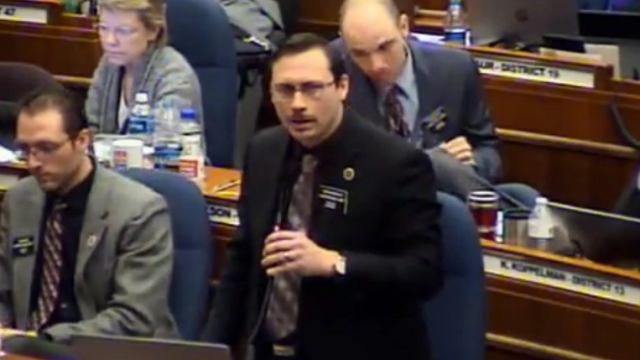Video: House Votes to Block Executive Branch From Introducing Legislation

HB1397 touches on a couple of the peculiarities to the North Dakota legislative process.
The first is the tradition that every bill introduced in a given Legislative session gets a committee hearing and a floor vote.
The second is that North Dakota is the only state in the union where the executive branch can introduce legislation.
What HB1397, which was introduced by Rep. Nathan Toman (R-Mandan), does is require that all bills introduced for consideration by the Legislature be sponsored by a legislator. There are a few exemptions – the Governor can introduce his/her budget for the various state agencies and the judiciary can introduce their budgets – but that’s it. Everything else has to go through a lawmaker.
“If we’re going to consider every bill that comes forward we should limit who can introduce,” Rep. Chris Olson (R-West Fargo) said on the House floor.
[mks_pullquote align=”right” width=”300″ size=”24″ bg_color=”#ffffff” txt_color=”#000000″]”If someone wants to introduce a bill they should put their name on the ballot,” he said. “We did.”[/mks_pullquote]
That makes a lot of sense. But then, so did Rep. Marvin Nelson (D-Rolla) who carried a “do not pass” recommendation for the bill out of committee to the House floor.
He called the bill “mostly a bother to the process” and noted that lawmakers often miss their own committee work so they can testify on their bills before other committees. But his strongest argument was that limiting executive branch introduction of bills might encourage them to write more administrative code of their own outside of the legislative process.
According to Nelson the executive branch produced some 3,000 pages of new code during the last legislative interim.
That’s…a really good point.
Philosophically I like HB1397 – I believe very much in the separation of powers – and Rep. Olson’s arguments are compelling. I also thought Rep. Aaron McWilliams (R-Hillsboro) made a strong point. “If someone wants to introduce a bill they should put their name on the ballot,” he said. “We did.”
I’m just not sure how much the bill will change anything in Bismarck. I don’t think it would reduce the number of bills introduced. If anything, as Nelson noted, it might embolden the executive branch to implement more policy without the lawmakers.
On a side note, it was interesting that the only two lawmakers (outside of Nelson the bill carrier) who rose to speak against the bill on the floor were Rep. Lawrence Klemin and Rep. George Keiser, both of Bismarck.
Bismarck, of course, being home to the largest concentration of state officials who would no longer be able to directly introduce bills under this legislation.
Here’s video the floor debate. The bill passed on a 48-44 vote.
[fcc_jw_player key=”BdPQFMyc”]




